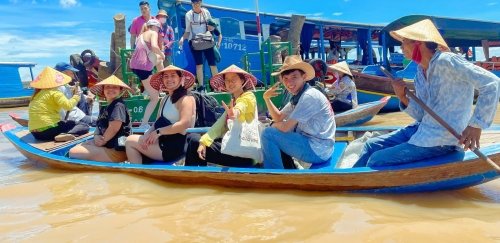
Study Abroad and Experiential Learning
Studying abroad gives you much more than great memories. Study abroad offers unique experiences that enhance your academic career and personal goals.
It develops independence and a sense of accomplishment and introduces you to different cultures providing a better understanding of others. It also helps you acquire the skills to be an engaged global citizen. Go on a journey of self-discovery!
Study Abroad Helpful Information
There are several opportunities available for a study abroad experience. What type of program are you interested in?
Bilateral Exchange Program – Reciprocal agreement between Commonwealth University (agreements vary by campus) and an international institution for an equal exchange of students. Students must apply through their home campus study abroad application system and be approved and nominated by the Study Abroad Coordinator. The exchange program allows CU students to pay Commonwealth University tuition and receive CU course equivalency credits for classes taken abroad. Pre-approved course credits will go towards total credits earned. Grades for these courses will be included in the cumulative GPA. Students should refer to the specific program for details as there are differences in things such as room and board options and additional costs.
Faculty-Led Program – Faculty-led programs (FLPs) are short-term study abroad programs led by a Commonwealth University faculty member. The programs are typically offered during the summer and winter terms and require a specific minimum number of students for the course to take place. Students pay CU tuition for the course as well as a program fee for accommodations, meals, excursions, airfare, etc. These programs focus on a specific academic area. Students are enrolled directly in the CU course and will earn credits and grades for each course.
Third-Party Study Abroad – Third-party study abroad providers are independent organizations that facilitate or administer study abroad programs. Please see the information provided on the Third-Party Providers page regarding the providers with which Commonwealth University has official partnership agreements.
NOTE: Pay close attention to the information regarding third-party programs with which we do not have an agreement.
Direct Enrollment – Direct Enroll programs are similar to exchange programs in duration, independence and academics. Direct Enroll programs differ in that outgoing students are responsible for all business related to applying, enrolling, finding housing, etc. This type of program is best for someone very independent and organized. This type of program is also the most immersive as students are placed in classes with local students versus other study abroad students.
Other – If you plan to study abroad through another university's study abroad program, you must notify the Office of the Registrar and the Center for Global Engagement. You will need to have your courses pre-approved by your adviser and the department chair of your major. At the end of your exchange semester, have your transcript sent to the Center for Global Engagement for evaluation and credit transfer.
ISEP offers an array of ISEP Exchange and ISEP Direct programs among a global community of more than 300 universities and colleges in over 50 countries. More than 60,000 students from our member institutions have participated in our semester-long, full-year, and summer programs. With ISEP, students have unmatched access to high-quality academic opportunities, authentic local experiences and exceptional support.
Things to Consider:
- Program Affordability
- Review the costs involved to determine if a program is right for you. Review costs for tuition, course materials, housing, airfare, travel, daily expenses such as food and transportation, etc.
- Program Format
- Some courses may be taught in a similar fashion to US courses while others will require that students do more independent learning.
- Program Types
- Determine the type of program you are interested in. Exchange, Faculty Led, Third-Party, Direct
- Program Duration
- Determine when your study abroad experience will best fit in to your overall goals. Should you study abroad during a semester, a winter or summer session, or an entire academic year? Will the courses you need be available during the time you wish to go abroad?
- Program Destination
- Where do you want to go? All of the items above may play a factor in determining where you will study. Keep in mind the type of school you are interested in, a business school, school for the arts, etc., the cost you are comfortable with, and the courses offered during the time you wish to study abroad.
- Keep in mind the area's geography, weather, food, arts, political climate, health issues, language(s) spoken, etc.
An important part of the process is to meet with your faculty advisor to determine when it would best fit your schedule to study abroad. You will need to discuss possible courses to ensure you will get the appropriate credit and keep you on track to graduate.
Possible Terms:
- Fall Semester
- Winter Session
- Spring Semester
- Summer Session
- Academic Year
Students must apply through the through the Center for Global Engagement/Global Education Office Study Abroad Coordinator at their home campus to be considered for a study abroad program.
Students are nominated by the Center for Global Engagement Coordinator to attend programs. Once you have completed your application, it will be reviewed. If your application meets the criteria for the program you selected, the coordinator will submit a nomination to the program director.
The program will then contact you to apply using their application.
Faculty-led programs are credit bearing study abroad programs. Students are financially responsible for paying tuition and fees as well as all other costs associated with the program, including air fare, housing, meals, transportation fees, and special events or admissions. Financial aid can be used to help pay for faculty-led programs, and some scholarships are available to help with the cost of the program.
Students will know the cost before committing to participate in the faculty-led program. For more information about any of CU’s faculty-led programs, please contact the CGE or the faculty-leader.
PCS 355: Politics and Culture in Belize
- Faculty Leader: Dr. Jeff Bosworth, jboswort@commonwealthu.edu | 570-662-4764
- Faculty Leader: Dr. Jonathan Rothermel, jrotherm@commonwealthu.edu | 570-662-4487
Journey to the English-speaking, Central American country of Belize with Drs. Jeff Bosworth and Jon Rothermel! The immersive education experience of the Belize summer program goes beyond the confines of traditional classrooms into a world of Mayan sites, cultural communities, rainforests, and barrier reefs. These experiences offer students the opportunity to broaden their horizons, gain self-awareness, and understand their own culture better.
The summer course on Belizean politics and culture includes a 15-day adventure that promises personal growth, academic enrichment, and cultural immersion. It is designed for everyone with a sense of adventure and curiosity and is open to all majors.
Belize is home to a rich cultural tapestry and a fascinating history that includes the descendants of the original Maya civilization as well as a wide variety of modern ethnic groups: Creole, Mestizo, Garifuna, Mennonite, and many others. A former British colony, Belize stands today as a proud democratic system facing the challenges of economic development and environmental sustainability. It is a unique lens through which students learn through interdisciplinary perspectives and from interviews with local Belizeans, directed readings, and hands-on activities.
HLTH498: Health Care Access in Jamaica
- Faculty leader: Amy Way, away1@commonwealthu.edu | 814-768-34341
- Faculty Leader: Jennifer Bell, jbell3@commonwealthu.edu | 814-768-3628
This serving-learning program is part of a course (HLSC490). This class is open to all majors, and students may select either a 1 credit or 3 credit option.
Students will learn and serve in the small, rural community of Harmons, Jamaica. Harmons is an under-resourced community with about 2 of every 3 people under-employed. Because of expense and its remote location, consistent education past the 6th grade is often difficult. Quality medical treatment is lacking and money for basic needs is limited.
Students experience hands on learning and provide medical care and information to the residents of Harmons in a variety of was including running a health fair and/or clinic;
meeting one-on-one with community members to discuss their healthcare concerns and needs; running a dental hygiene program for school-aged children; and conducting home health care visits. In addition to healthcare services, students aid local educators who have very limited supplies and support. Students may also assist in new home construction of very small houses (12” x15’)
PHYS108: Galileo -The Father of Experimental Science
- Faculty Leader: Dr. Michael Cullin, mcullin@commonwealthu.edu | 570-484-281
An introduction to physical science concepts, their applications, and the nature of science through an examination of the life and work of Galileo one of human history’s most important figures: Galileo. Explore Rome, Sienna, Pisa, and Florence as you walk in his footsteps. Learn about Galileo’s scientific discoveries, inventions, and controversies and conflicts that were created by his support of Copernicus’ revolutionary theory of the solar system. This program is open to all majors.
ENGL340: British Literature and Culture - Literature in London
- Faculty Leader: Dr. Christina Francis, cfrancis@commonwealthu.edu, 570-389-4661
London’s calling! Travel to London, England to discover a new country through the eyes of London Authors, while staying in apartment accommodations. The program runs 3 weeks, from May 20th to June 9th. Students will tour the city of London, take 2 excursions, visit museums, and attend 3 plays, as well as enjoy free time for their own explorations.
Connect with the Center for Global Engagement
Assistant Director, International Student Services & International Admissions
- Lock Haven


